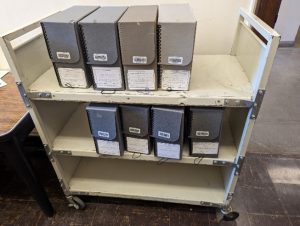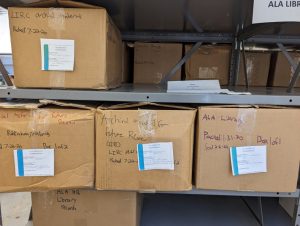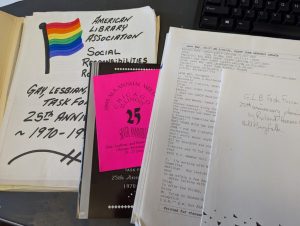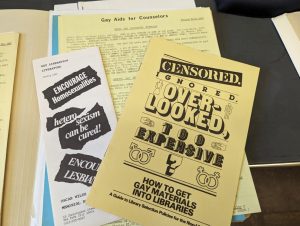Blog Post by Yung-hui Chou
During the Spring 2024 semester, I worked at the ALA Archives and gained valuable archival experience. For MSLIS students at the University of Illinois Urbana-Champaign like myself, a practicum is a credit-earning field experience supervised by our selected information organization. Given my interest in both archival careers and the history of libraries and librarianship, I couldn’t think of a more suitable practicum site than the ALA Archives.

I am very thankful to my site supervisor Cara Bertram, the ALA’s Archives Program Officer, for offering me a well-round experience. Cara thoughtfully assigned me projects that sequentially built my knowledge and skills in archival processing. I started with interfiling (adding new items to existing records) and updating finding aids, gradually advancing to arranging and describing an entire record series. Throughout the semester, I participated in a variety of tasks, including inventorying backlog materials, writing biographical notes, digitizing photographs, organizing born-digital materials, creating metadata for digital collections, and collecting information for the archives’ reference services. Working in a small unit means one has the opportunity to handle all aspects of archival work, which is the most beneficial part for practicum students.
My practicum also exposed me to many decisions that archivists face at work. For example, how should new records, received from the ALA Headquarters, be identified and assigned to the correct box and series? Which items should be kept in archival collections, and which should not? How can archival materials be arranged for optimal access, while preserving the original order? What information should be included on the control card to help researchers and archives staff efficiently locate the necessary materials? While these questions could be challenging, I was fortunate to have a supportive supervisor who patiently handled all my questions. The detailed guidelines at the ALA Archives also helped me become more comfortable with archival processing.


Furthermore, as I became more familiar with the ongoing projects and activities at the ALA Archives, I gained a deeper understanding of the challenges involved in archive administration. These include how to effectively promote the archive’s collections (for the ALA Archives, that often means to keep up with happenings in the library world and highlight relevant records), how to provide access to as many records as possible with limited time and staffing, and how to secure enough climate-controlled storage spaces for the growing collection. Although these issues go beyond my current role, they are worth keeping in mind as I prepare for a career in archives.
The most enjoyable part of my practicum is discovering something new about library history every day while working in the archives. My most recent project is to process several boxes of records from the Rainbow Round Table (RRT) of the ALA, which is the country’s first professional organization for gay, lesbian, bisexual, and transgender individuals. Looking through folders and folders of documents, I gradually traced the history of the organization back to the 1970s, when it was known as ALA’s Task Force on Gay Liberation. Their many initiatives – such as hosting book awards, organizing outreach activities, and creating bibliography and resource guides for and about LGBT groups – have broadened my view of what librarians could do to support marginalized communities.


Note from the Archivist: The American Library Association Archives was thrilled to host its first practicum student from the University of Illinois iSchool, Yung-hui Chou! If you are interested in obtaining hands on archival experience, please email the ALA Archives at ala-archives@library.illinois.edu. No experience is required, only a strong interest in the archives and special collections profession!